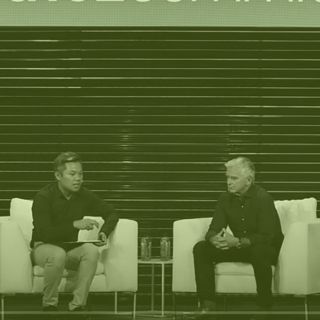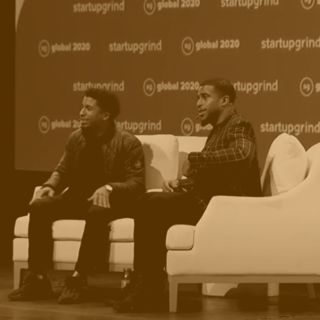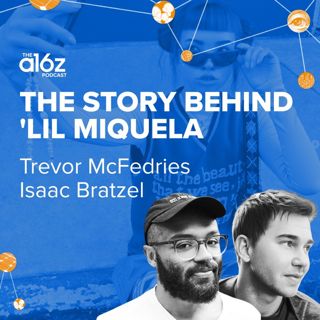
Podcasting and the Future of Audio
This podcast (first recorded in 2019, now being rerun) -- is a podcast about podcasting: But it's really all about audio. A lot's changed... and a lot hasn't. How do we define "podcasts"; how does the feeds ecosystem currently work; what content and entertainment experiments might change how people not just consume, but create, in the medium? Not to mention monetize, discover, etc... Nick Quah, writer and publisher of Hot Pod (also at Vulture) joins a16z general partner Connie Chan -- and editor in chief (and showrunner of the a16z Podcast) Sonal Chokshi -- to talk about all this and more in this hallway-style jam. The views expressed here are those of the individual AH Capital Management, L.L.C. (“a16z”) personnel quoted and are not the views of a16z or its affiliates.This content is provided for informational purposes only, and should not be relied upon as legal, business, investment, or tax advice. You should consult your own advisers as to those matters. References to any securities or digital assets are for illustrative purposes only and do not constitute an investment recommendation or offer to provide investment advisory services. Furthermore, this content is not directed at nor intended for use by any investor or prospective investor, and may not under any circumstances be relied upon when making a decision to invest in any fund managed by a16z. (An offering to invest in an a16z fund will be made only by the private placement memorandum, subscription agreement, and other relevant documentation of any such fund which should be read in their entirety.)Past performance is not indicative of future results. Any charts and graphs provided within are for informational purposes solely and should not be relied upon when making any investment decision. Please see https://a16z.com/disclosures for additional important information. Stay Updated:Find a16z on XFind a16z on LinkedInListen to the a16z Podcast on SpotifyListen to the a16z Podcast on Apple PodcastsFollow our host: https://twitter.com/eriktorenberg Please note that the content here is for informational purposes only; should NOT be taken as legal, business, tax, or investment advice or be used to evaluate any investment or security; and is not directed at any investors or potential investors in any a16z fund. a16z and its affiliates may maintain investments in the companies discussed. For more details please see a16z.com/disclosures. Hosted by Simplecast, an AdsWizz company. See pcm.adswizz.com for information about our collection and use of personal data for advertising.
20 Maj 20201h 6min

Growth in Turbulent Times
In normal times, every company operates against some hypothetical growth model—a data-driven framework that describes how your product grows and how you acquire new users. These, of course, are not normal times. In the fallout from the pandemic, most founders and CEOs are in the process of completely revamping their growth models from the bottom up amid new and unpredictable consumer behavior. This episode explores how to think about growth in turbulent times, according to two growth experts: a16z general partner Andrew Chen, who previously led the growth team at Uber, and Brian Balfour, formerly the VP of Growth at HubSpot, now the founder and CEO of Reforge, a masterclass in growth strategies (in conversation with host Lauren Murrow).The discussion spans four sections: first, how to reassess your existing growth model, particularly when, as Brian says, the data is "completely messed"; next, we drill down into strategy and tactics for surviving the current crisis and talk about how founders can pursue growth even in the midst of widespread uncertainty and cutbacks. Third, we look ahead to discuss scenario planning and how leaders can forge a path forward. Finally, we zoom out and assess the big picture: how various categories of company may be impacted long-term, how this crisis compares to 2008 (and what that means for early-stage founders), and the industries and business models that are now prime for growth. Stay Updated:Find a16z on XFind a16z on LinkedInListen to the a16z Podcast on SpotifyListen to the a16z Podcast on Apple PodcastsFollow our host: https://twitter.com/eriktorenberg Please note that the content here is for informational purposes only; should NOT be taken as legal, business, tax, or investment advice or be used to evaluate any investment or security; and is not directed at any investors or potential investors in any a16z fund. a16z and its affiliates may maintain investments in the companies discussed. For more details please see a16z.com/disclosures. Hosted by Simplecast, an AdsWizz company. See pcm.adswizz.com for information about our collection and use of personal data for advertising.
15 Maj 202036min

Journal Club: Using CRISPR to Prevent Coronavirus and Influenza Infection
In this episode of a16z bio Journal Club, general partner Vijay Pande, bio deal team partner Andy Tran, and bio editor Lauren Richardson discuss a novel CRISPR-Cas-based anti-viral strategy.The discussion covers the differences between this newly developed prophylactic strategy, traditional vaccines, and anti-viral drugs; how this strategy can be engineered to target a huge range of coronavirus and influenza strains; and the next steps needed to go from paper to practice:“Development of CRISPR as an Antiviral Strategy to Combat SARS-CoV-2 and Influenza” in Cell (April 2020), by Timothy Abbott, Girija Dhamdhere, Yanxia Liu, Xueqiu Lin, Laine Goudy, Leiping Zeng, Augustine Chemparathy, Stephen Chmura, Nicholas Heaton, Robert Debs, Tara Pande, Drew Endy, Marie La Russa, David Lewis, and Lei Qia16z Journal Club (part of the a16z Podcast), curates and covers recent advances from the scientific literature -- what papers we’re reading, and why they matter from our perspective at the intersection of biology & technology (for bio journal club). You can find all these episodes at a16z.com/journalclub. Stay Updated:Find a16z on XFind a16z on LinkedInListen to the a16z Podcast on SpotifyListen to the a16z Podcast on Apple PodcastsFollow our host: https://twitter.com/eriktorenberg Please note that the content here is for informational purposes only; should NOT be taken as legal, business, tax, or investment advice or be used to evaluate any investment or security; and is not directed at any investors or potential investors in any a16z fund. a16z and its affiliates may maintain investments in the companies discussed. For more details please see a16z.com/disclosures. Hosted by Simplecast, an AdsWizz company. See pcm.adswizz.com for information about our collection and use of personal data for advertising.
15 Maj 202017min

What's Next in Gaming
Video game technology has evolved into a global phenomenon that extends far beyond entertainment. In this episode, John Riccitiello, CEO of the game software development company Unity Technologies, is interviewed by a16z general partner Andrew Chen on the rise of esports and streaming, the potential of cloud gaming, and far-reaching applications for game technology. This conversation originally took place at our most recent innovation conference, the a16z Summit. Stay Updated:Find a16z on XFind a16z on LinkedInListen to the a16z Podcast on SpotifyListen to the a16z Podcast on Apple PodcastsFollow our host: https://twitter.com/eriktorenberg Please note that the content here is for informational purposes only; should NOT be taken as legal, business, tax, or investment advice or be used to evaluate any investment or security; and is not directed at any investors or potential investors in any a16z fund. a16z and its affiliates may maintain investments in the companies discussed. For more details please see a16z.com/disclosures. Hosted by Simplecast, an AdsWizz company. See pcm.adswizz.com for information about our collection and use of personal data for advertising.
7 Maj 202020min

Undruggable Drugs
In this episode of the a16z Podcast, we take a deep dive into the world of drug development—specifically "undruggable drugs": a category of protein, protein family or even piece of RNA that’s so difficult to target that many researchers don’t even want to touch it. Jay Bradner, President of the Novartis Institute for BioMedical Research, shares with a16z General Partners Jorge Conde and Vijay Pande, and a16z's Hanne Tidnam, all the new tools, technologies and breakthroughs which are causing the science of therapeutics to explode in some of these areas where it's been incredibly difficult (even impossible) in the past. From molecular glues to cell and gene therapies, Bradner shares the behind-the-scenes science stories of what it really takes to make a new drug that shatters the category of an "undruggable" target. Stay Updated:Find a16z on XFind a16z on LinkedInListen to the a16z Podcast on SpotifyListen to the a16z Podcast on Apple PodcastsFollow our host: https://twitter.com/eriktorenberg Please note that the content here is for informational purposes only; should NOT be taken as legal, business, tax, or investment advice or be used to evaluate any investment or security; and is not directed at any investors or potential investors in any a16z fund. a16z and its affiliates may maintain investments in the companies discussed. For more details please see a16z.com/disclosures. Hosted by Simplecast, an AdsWizz company. See pcm.adswizz.com for information about our collection and use of personal data for advertising.
6 Maj 202028min

The Next Generation of Cultural Influencers in Tech
This episode—which originally took place as a live event—is a conversation between Seattle Seahawks linebacker Bobby Wagner and a16z Cultural Leadership Fund partner Chris Lyons. Wagner is known for his power on the field and his business acumen off it. Last year, he negotiated his own three-year, $54 million contract extension to become the highest-paid middle linebacker in the NFL. In this candid conversation, Wagner and Lyons discuss how to identify standout companies and talent (for better or worse), the growing influence of cultural leaders in tech, and the potential of "shared genius." Stay Updated:Find a16z on XFind a16z on LinkedInListen to the a16z Podcast on SpotifyListen to the a16z Podcast on Apple PodcastsFollow our host: https://twitter.com/eriktorenberg Please note that the content here is for informational purposes only; should NOT be taken as legal, business, tax, or investment advice or be used to evaluate any investment or security; and is not directed at any investors or potential investors in any a16z fund. a16z and its affiliates may maintain investments in the companies discussed. For more details please see a16z.com/disclosures. Hosted by Simplecast, an AdsWizz company. See pcm.adswizz.com for information about our collection and use of personal data for advertising.
2 Maj 202013min

The Chief Security Officer in (and out of) a Crisis
The Chief Security Officer (CSO/CISO) used to manage on-premise servers, now the information they have to secure has migrated to the cloud. As the responsibility of CSOs has expanded, the role has moved from technical IT to the boardroom. How do the best CSOs prepare for and respond to a crisis, from redteaming to comms? What responsibility should cloud & SaaS vendors, not to mention the government, have in security and data breaches? And how is the role going to evolve in the next five years? At our a16z Innovation Summit last year, we sat down with two security leaders whose career has evolved as the role has – Joe Sullivan, former CSO at Uber and Facebook, now at Cloudflare and Joel de la Garza, current security partner at a16z, formerly CISO at Box. Stay Updated:Find a16z on XFind a16z on LinkedInListen to the a16z Podcast on SpotifyListen to the a16z Podcast on Apple PodcastsFollow our host: https://twitter.com/eriktorenberg Please note that the content here is for informational purposes only; should NOT be taken as legal, business, tax, or investment advice or be used to evaluate any investment or security; and is not directed at any investors or potential investors in any a16z fund. a16z and its affiliates may maintain investments in the companies discussed. For more details please see a16z.com/disclosures. Hosted by Simplecast, an AdsWizz company. See pcm.adswizz.com for information about our collection and use of personal data for advertising.
29 Apr 202020min

Journal Club: Finding New Antibiotics with Machine Learning, What Coronavirus Structures Tell Us
a16z Journal Club (part of the a16z Podcast), curates and covers recent advances from the scientific literature -- what papers we’re reading, and why they matter from our perspective at the intersection of biology & technology (for bio journal club). This inaugural episode covers 2 different topics, in discussion with Lauren Richardson:0:26 #1 identifying new antibiotics through a novel machine-learning based approach -- a16z general partner Vijay Pande and bio deal partner Andy Tran discuss the business of pharma; the specific methods/ how it works; and other applications for deep learning in drug discovery and development based on this paper:"A Deep Learning Approach to Antibiotic Discovery" in Cell (February 2020), by Jonathan Stokes, Kevin Yang, Kyle Swanson, Wengong Jin, Andres Cubillos-Ruiz, Nina Donghia, Craig MacNair, Shawn French, Lindsey Carfrae, Zohar Bloom-Ackermann, Victoria Tran, Anush Chiappino-Pepe, Ahmed Badran, Ian Andrews, Emma Chory, George Church, Eric Brown, Tommi Jaakkola, Regina Barzilay, James Collins11:43 #2 characterizing the novel coronavirus causing the COVID-19 pandemic -- a16z bio deal partner Judy Savitskaya shares what we can learn from the protein structures; the relationship to the 2002-2004 SARS epidemic; and more based on these two research articles: "Structure, Function, and Antigenicity of the SARS-CoV-2 Spike Glycoprotein" in Cell (April 2020), by Alexandra Walls, Young-Jun Park, M. Tortorici, Abigail Wall, Andrew McGuire, David Veesler"Cryo-EM structure of the 2019-nCoV spike in the prefusion conformation" in Science (March 2020), by Daniel Wrapp, Nianshuang Wang, Kizzmekia Corbett, Jory Goldsmith, Ching-Lin Hsieh, Olubukola Abiona, Barney Graham, Jason McLellanYou can find these episodes at a16z.com/journalclub. Stay Updated:Find a16z on XFind a16z on LinkedInListen to the a16z Podcast on SpotifyListen to the a16z Podcast on Apple PodcastsFollow our host: https://twitter.com/eriktorenberg Please note that the content here is for informational purposes only; should NOT be taken as legal, business, tax, or investment advice or be used to evaluate any investment or security; and is not directed at any investors or potential investors in any a16z fund. a16z and its affiliates may maintain investments in the companies discussed. For more details please see a16z.com/disclosures. Hosted by Simplecast, an AdsWizz company. See pcm.adswizz.com for information about our collection and use of personal data for advertising.
26 Apr 202024min






















